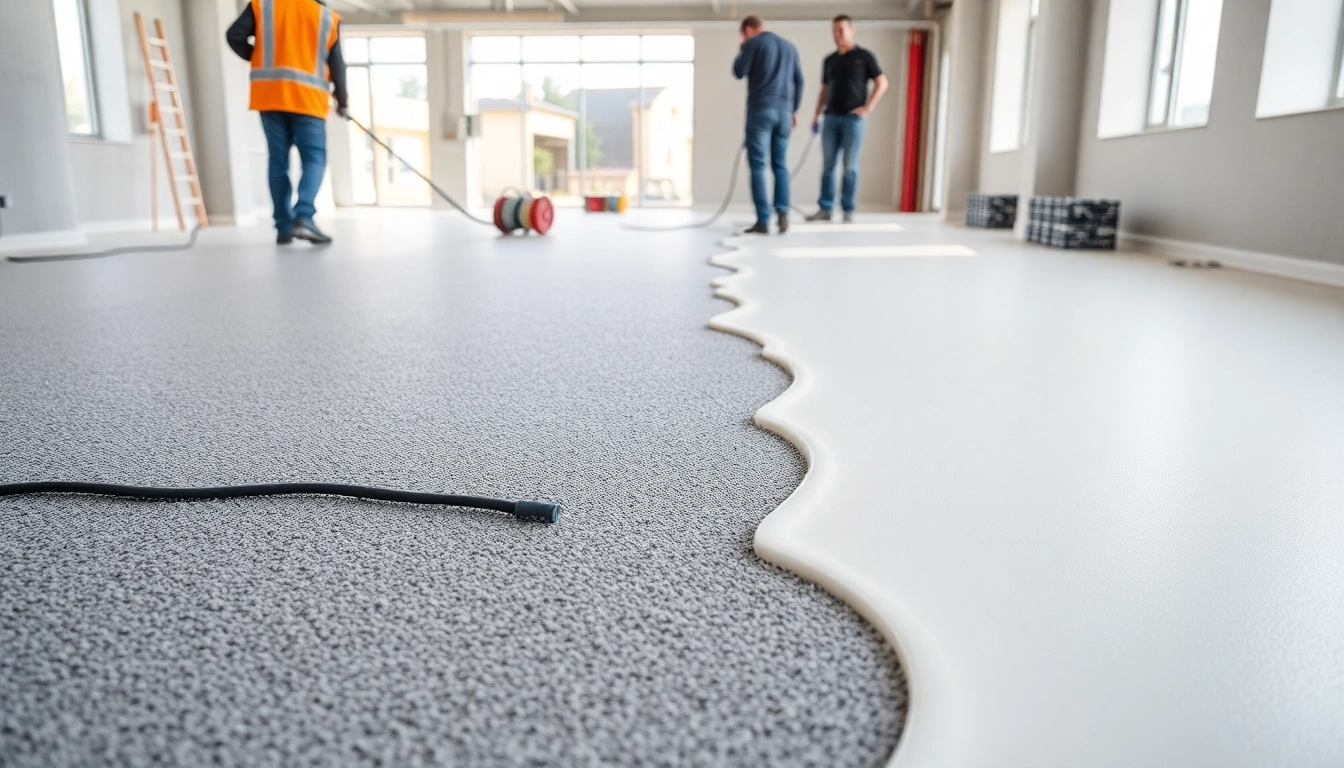Understanding Liquid Screeding in Birmingham
When it comes to creating a smooth, durable, and efficient flooring surface, liquid screeding has become an increasingly popular choice among homeowners and professionals in Birmingham. This advanced flooring solution offers numerous benefits over traditional methods, particularly when integrated with underfloor heating systems. For those considering this modern approach, understanding the mechanics of liquid screeding, its applications, and the unique advantages it provides is essential.
To explore the best options for your project, you can visit Liquid screeding Birmingham for expert insights and tailored solutions. In this comprehensive guide, we delve into what liquid screeding entails, its benefits, applications, and how to ensure a successful installation tailored to Birmingham’s diverse property landscape.
What is Liquid Screeding and How Does It Work?
Liquid screeding is a modern flooring process where a flowable, self-leveling mixture of cement, sand, water, and sometimes special additives is poured across a prepared subfloor. Unlike traditional sand and cement screeds that require manual spreading and levelling, liquid screeds are pumped directly onto the surface, enabling a rapid and uniform application. This process ensures an even, high-quality finish with minimal manual effort.
The primary ingredients in liquid screeding typically include cementitious materials and fine sands, mixed with water and ready-mix additives that enhance workability, adhesion, and drying times. This formulation allows the screed to flow readily, filling all gaps and voids, thus creating a perfectly level surface that prepares the floor for final coverings such as tiles, carpets, or hardwoods.
With climate conditions, such as those in Birmingham, and specific project demands, customized formulations of liquid screed can be tailored for optimal performance, ensuring it integrates seamlessly with underfloor heating and hardwood flooring requirements.
Benefits of Choosing Liquid Screed for Your Property
- Rapid Installation: Liquid screed’s flowable nature speeds up the laying process, reducing project timelines significantly, which is crucial for time-sensitive refurbishments or new builds in Birmingham.
- High Precision and Smooth Finish: Its self-leveling properties create an impeccably flat surface, reducing the need for additional levelling or smoothing works later.
- Excellent Heat Transfer: When used with underfloor heating, liquid screed ensures optimal heat distribution by coating the pipes uniformly, eliminating air gaps and heat travel losses.
- Reduced Labour Costs: Automated pouring reduces manual labour, minimizing human error and ensuring consistent quality throughout the installation.
- Versatility: Suitable for varied substrates and building types, including residential, commercial, and industrial properties in Birmingham.
- Enhanced Durability: Modern formulations provide robust, long-lasting surfaces resistant to cracking and deformation under load.
Typical Applications and Industries Served in Birmingham
Liquid screeding finds extensive use across multiple sectors in Birmingham, driven by its efficiency and high performance:
- Residential Homes: For installing underfloor heating systems beneath living rooms, kitchens, and bathrooms.
- Commercial Developments: Office complexes, retail outlets, and warehousing facilities benefit from quick, reliable floor finishes.
- Industrial Facilities: Manufacturing plants and distribution centers require durable, level surfaces for heavy machinery and high traffic.
- Public Infrastructure: Hospitals, schools, and transport hubs utilize liquid screed for resilient and quickly operational flooring.
Birmingham’s dynamic property market and diverse construction projects demand floor solutions that combine speed, durability, and precision—attributes that liquid screeding consistently delivers.
Key Factors to Consider Before Installing Liquid Screeding
Assessing Your Project’s Size and Scope
Accurately determining the size and scope of your project is fundamental. Larger projects benefit from bulk purchasing and multiple team coordination, but require meticulous planning to ensure quality control. Smaller renovations might emphasize quick turnaround times and minimal disruption, which liquid screeding can facilitate thanks to its fast-drying properties.
Measure the total area, including variations in surface height, to select an appropriate mix and batch size. Professional consultation helps in understanding the nuances, such as subfloor compatibility, moisture levels, and load demands specific to Birmingham’s climatic conditions.
Choosing the Right Type of Liquid Screed for Birmingham Homes and Businesses
Various formulations of liquid screed are available, tailored for specific needs:
- Fast-Drying Variants: Ideal for projects requiring rapid completion, minimizing downtime in commercial or residential settings.
- High-Flow Mixes: Suitable for complex substrates or intricate underfloor heating networks. These mixes ensure thorough pipe coating and consistent heat transfer.
- Self-Compacting Screed: Designed for high-precision projects where minimal manual intervention is desired.
Consult with regional providers familiar with Birmingham’s building codes and environmental conditions to select the most appropriate mix.
Preparation and Planning for a Smooth Installation Process
Proper planning and site preparation are crucial for successful liquid screeding. This includes:
- Ensuring the subfloor is clean, dry, and structurally sound.
- Installing necessary insulation and moisture barriers, especially for ground-level floors.
- Verifying that underfloor heating systems are correctly installed and tested before pouring the screed.
- Scheduling in suitable weather conditions; dry, moderate temperatures facilitate faster setting and curing.
Engaging experienced installers ensures these steps are meticulously executed, avoiding common pitfalls such as air pockets or surface imperfections.
Executing Liquid Screeding in Birmingham: Best Practices
Step-by-Step Installation Process
- Site Preparation: Clear the area, manage existing debris, and prepare the subfloor according to specifications.
- Mix and Pump Preparation: Ensure the liquid screed mixture is correctly proportioned and homogenized in line with manufacturer instructions.
- Pouring: Pump the liquid screed evenly across the surface, starting from one corner and moving systematically to avoid overlaps and gaps.
- Leveling and Finishing: Use screed rakes and floaters to assist in self-leveling, ensuring an even surface.
- Curing: Allow the screed to cure in controlled conditions, ideally maintaining a stable temperature and humidity to prevent cracks and ensure strength.
Throughout the process, real-time monitoring of flow and consistency is essential to meet quality standards and project deadlines.
Common Challenges and How to Overcome Them
Despite its numerous advantages, liquid screeding can face issues such as surface cracking, delamination, or delayed curing if not properly managed. Addressing these challenges involves:
- Ensuring Proper Subfloor Conditions: Moisture levels should be within specified limits; excessive moisture can impair curing.
- Maintaining Accurate Mix Ratios: Use calibrated equipment and adhere strictly to manufacturer guidelines.
- Controlling Environmental Conditions: Avoid installation in adverse weather; ensure adequate ventilation and temperature control.
- Engaging Skilled Installers: Professionals with experience in Birmingham projects understand regional nuances and can adapt procedures accordingly.
Ensuring Quality and Longevity of the Floor Finish
Post-installation care is critical for maximizing lifespan and performance. Key recommendations include:
- Allowing sufficient curing time, typically 7-28 days depending on formulation and environmental conditions.
- Avoiding heavy loads or traffic on the floor during the initial curing phase.
- Performing regular inspections for cracks or surface irregularities, addressing minor issues promptly.
- Implementing proper sealing and finishing layers as per project specifications for added protection.
Adopting these practices ensures that your Birmingham property benefits from a resilient, efficient, and high-quality floor surface for years to come.
Cost, Efficiency, and Performance Metrics
Cost Factors and Budgeting for Liquid Screed Projects
The overall cost of liquid screeding projects in Birmingham depends on several factors, including project size, formulation type, labor charges, and preparatory work. While initial expenses might be higher than traditional screeding, the speed of installation and reduced labor often offset costs. Additionally, the superior thermal performance can lead to energy savings long-term, making it a cost-effective solution.
Engaging regional suppliers and installers can provide competitive quotes and tailored packages, helping you stay within budget without compromising quality.
Time-Saving Benefits of Modern Liquid Screeding Techniques
One of the most significant advantages is rapid project completion. Liquid screed can be poured and levelled within a day, with full curing often achieved in less than a month. This allows for faster installation of floor finishes, minimizing delays and enabling quicker occupancy or operational readiness, particularly important in Birmingham’s bustling development scene.
Measuring Success: Performance Indicators and Client Satisfaction
Success in liquid screeding projects can be gauged through:
- Flatness and levelness (measured by Floor Flatness and Levelness ratings)
- Uniform heat transfer in underfloor heating systems
- Absence of cracks or surface flaws over time
- Client feedback regarding project timelines, budget adherence, and overall quality
Regular maintenance and inspections ensure sustained performance, reinforcing the value and reliability of your investment in liquid screeding.
Finding Reliable Liquid Screeding Contractors in Birmingham
Important Qualities of a Trusted Installer
Choosing the right contractor is pivotal. Look for providers with extensive experience in Birmingham, proven track records, and certification from industry bodies. Responsible contractors should also offer detailed quotations, reliable timelines, and transparent communication throughout the project.
Questions to Ask Before Hiring a Liquid Screed Specialist
- Can you provide references from previous Birmingham projects?
- Are you familiar with local building regulations and standards?
- What formulations do you recommend for my specific needs?
- What is your estimated timeline and project management approach?
- Do you offer post-installation support or warranties?
How to Verify Certifications and Experience in Birmingham
Ensure potential contractors hold relevant certifications from industry authorities, such as the Federation of Master Builders or specific screeding associations. Review their portfolio of Birmingham projects, read customer testimonials, and verify insurance and licensing status. Visiting previous sites or requesting case studies can also provide assurance of their capabilities.



